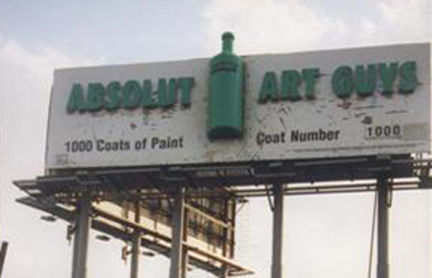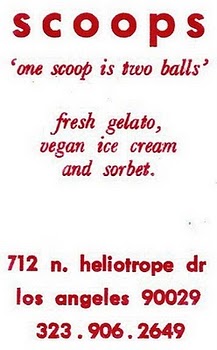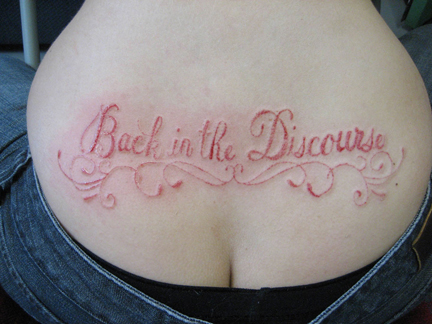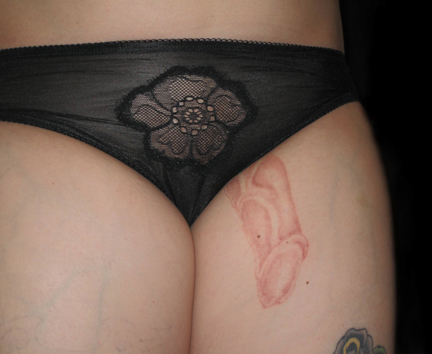
There is a myth out there that artists are not good at business. I did a survey about six months ago of gallery dealers in Los Angeles, and asked them about artists and entrepreneurship, and the business of art. The most common reply was that artists are not good for anything but making art. And the second most common reply was that artists should leave the business of art to dealers. I want to share some of my colleagues' success stories in order to show a different point of view -- from the perspective of an artist who has run a number of successful businesses.
Artists are creative people, and it takes a great deal of creativity to successfully run a business. Businesses thrive off of new ideas, new models of working, and inventive marketing strategies. Good entrepreneurs are basically creative problem solvers. Similarly, artists look at problems in an unexpected and fresh way, and are able to see the big picture as well as the details. They don't always follow the rules. Businesses are changing drastically with the evolution of the world and new ideas and models are desperately needed. This is where artists come in.
Most everyone has heard the phrase "the MFA is the new MBA," and companies have been increasingly hiring creatives in order to teach creative skills to administrators as well as workers. Businesses are collaborating with artists and arts organizations across the country, utilizing the mind-set of creatives to expand on ideas such as problem solving, creative solutions for marketing or just learning to be creative in decision making. Corporations often get into a rut doing things the same way they have always done, and artists get hired to help them look beyond the old school strategies.
Every business has a bit of risk involved, and artists are used to taking risks. An art practice requires artists to do things they haven't done before, or to create things they have never seen. Artists are creative problem solvers and look for ways of creating new ideas. They contribute to the economy like everyone else does.
Artists also experience a lot of rejection. I always tell artists that they should be getting rejected all the time, that way they know that they are applying for enough opportunities. Hearing the word "No" is a large part of an artists' practice, and most artists have figured out how to get around the idea of "no", and use strategies to either do it themselves, or to find another venue.
Artists teach, run organizations (often called the "accidental administrator"), write reviews and articles and start businesses with success. Artists have multiple interests and are creating hybrid careers where they are working on their art practice, but instead of taking a job they hate to make ends meet, they are starting their own businesses that reflects those interests.
Max Leeser is an artist who recently started his own business making extreme brittle. He combined his culinary skills and his artist skills and created Morning Glory Confections. His products are in high-end stores across the country such as Dean and Deluca in NYC as well his own online store. His brittle comes in many unusual flavors such as Thai Curry and Peanut, Indian Curry and Pistachio, New Mexico Chili and Pumpkin Seed. His brittle is only made in small batches and is carefully hand-crafted, something artists are really good at! And his brittle has garnered endorsements and reviews from Martha Stewart Living, Eating LA, the Los Angeles Times Daily Dish and many more. You can also purchase a gift e-card to send to a friend or family member. I asked Max about his plans to start his own business, and said he wanted to make a living doing something he was passionate about, and knew that his art practice was not going to support him right away.

Morning Glory Confections
Every business needs a vision and the tenacity to stick it out. Either a business or an art career will provide many ups and downs, roadblocks, highs and lows. Since artists are used to this kind of wild ride career-wise, it makes them good business folks. Artists don't give up nearly as often as the average person either, which is another good skill to have, and even if their work does not sell or is not made for the market, they stick to it -- out of passion, dedication and hope.
Artist Bernard Brunon is a Los Angeles based artist. Born in France, Bernard comes to Los Angeles by way of Houston, TX. "With less to look at, there's more to think about" is the motto he gave his house painting company, "That's Painting Productions," over twenty years ago when his work as a house painter became his activity as an artist. That's Painting/Bernard Brunon was recently published in France, with interviews by Michael Kosch and Pascal Beausse, that describe Brunon's process and explains the motivations behind this trajectory. He has now moved his art practice and his business (which are one in the same) to Los Angeles. He does not charge more for painting a house than a regular contractor, but he does sign the work in the same color paint in an obscure place. He has managed up to 20 fellow painters as part of his business. Doing large public art projects is much the same as running a business, so he uses his skills for both his public art practice and his business practice which are one in the same.
Rennes, Saint-Etienne, France
He also writes for a number of publications, curates, recently painted Machine Project, a nonprofit in Los Angeles as an artwork where he had an event in honor of his new book publication complete with, "Music To Watch Paint Dry" by Emily Lacy. He not only paints houses, but has done public art projects such as a large library in France, painted walls in museums and collaborated with many artists who needed a wall painted as part of their own artwork or installation. He collaborated with The Art Guys, two men in Houston who created an Absolute Billboard Ad in which he was commissioned to paint the sign 1000 times, over a 6 month period.

Absolute Billboard, The Art Guys, Painted by That's Painting Productions
Seeing the world clearly and with a sense of critical perspective is a must for running a business as well as being an artist. Tai Kim is an artist who started Scoops, a popular ice cream, sherbet, and sorbet store in Los Angeles. Scoops provides a startling array of flavors to its hip visitors eager to try something new. The store even concocts special batches based on client suggestions. Some of my favorites are Brown Bread, Strawberry with Balsamic Vinegar, Lung Ching Tea with Ginger, Vegan Hazelnut Espresso, or Peppermint Tiramisu. Tai will try just about anything, and the selection changes every day. Not only that, but prices are good and service is friendly. Scoops also has an art gallery in the store and the current work this month is Alisa Yang and Ching Ching Cheng: Coloring -- Flavors of Childhood. You can find information here.

Scoops Logo

Scoops Sign
Diana DeAugustine is an artist who also has a tattoo business, renting space in a tattoo shop for her own practice. A recent graduate of CalArts, she moved to San Diego where she shares a tattoo shop with other more traditional tattoo artists. Her art studio and practice is called Studio Ephemeral and she describes it as an experimental tattoo process that involves tattooing with water instead of ink. The mark is ephemeral and is not intended to scar or leave a mark. She photographs these creations and documents the process. The photographs become the artwork. She creates traditional tattoos by day, and ephemeral tattoos as her art practice. She is always looking for volunteers she can create her work on, so if you are game, send her an email or check out her website at dianadeaugustine.artcodeinc.com.

Back in the Discourse, Diana DeAugustine

Lacking Nothing, Diana DeAugustine
Many artists run nonprofit organizations, and they require many of the same skills as running a for profit business. Especially with the increased pressure to generate earned income such as ticket sales, book sales, events and fundraisers since funding has reached an all time low. Local artists have started nonprofits themselves such as Anne Bray who created and runs LA Freewaves, Richard Amromin who created New Town, which creates exhibitions and music events. I founded Side Street Projects. Mark Allen is the founder of Machine Project. The list of artists running businesses and non-profits is long. The creative skills of artists is what keeps these places open, especially when funding is hard to come by. These artists also have their own practice as artists on top of these full time jobs.
Being an artist is one of the things that has helped me create successful business and nonprofit organizations. GYST Ink, which I founded, is an artist-run business that develops software, publications, resources and support services for artists. We only hire artists and work around their exhibition and project schedules. I don't know why more businesses are not flexible with their employees. It takes a bit of planning, but it all works out. I have a passion for making life better for artists, by providing information and resources to determine your career on your own terms.
Running a business is hard work, but no more that trying to have an art career. Most of the elements are the same: business licenses, networking, learning, perspective, passion and risk taking. Facing the unknown is a common occurrence, as well as oddball problem solving and challenging times.
Instead of changing your artwork so that it meets the criteria for collectors and dealers, perhaps making money another way allows artists to remain true to their own visions. I get so many emails from artists whose work is being pushed a certain direction by someone other than themselves and they are in a quandary about it. Most artists have multiple interests and those artists who I have profiled here are taking steps to have a hybrid career of multiple trajectories in order to have a place to make the most interesting work without having to compromise or "sell out", a popular term in art schools. See my Ted.com talk on hybrid careers for more information on hybrid careers for artists.
Artists have been fed a lot of strategies in terms of the "business of art" as well as ideas of running any kind of business. Most business of art workshops across the country only address the idea of getting a gallery. You no longer need a gallery to have an art career, so why not invest in a career you can thrive in and make a decent living at as well?
There are tons of free resources for artists on the web including gyst-ink.com/resources, nyfa.org, and chicagoartresources.org.
GYST created a Skills Bank (like a job bank but listing skills artists have) for artists where you can create a free listing and upload your resume. If you are an artist or in need of the skills of an artist, please check out the Skills Bank. Artists can teach workshops and share their skills as a way to earn income with the skills they already have.
If you are the creative type, and you are interested in starting your own business there is help out there in the world. At a time when it is hard to find jobs, perhaps creating your own would help out the income stream.
If you are an artist run business with a hybrid career (multiple streams of income) I would love to hear from you. If you are a creative individual with big dreams, or really great skills, consider the idea of starting your own business. If you are in a dead end job, or doing something you hate in order to make ends meet, there might be a solution that you had not considered. Create your own income stream, whether it is a full time business or something to help generate additional income. Perhaps this is a good time to consider a new way of thinking, just in time for a new years resolution. And don't let anyone tell you that artists are bad at business. Being an artist is running a business anyway, whether you want to think of it that way or not.
I would encourage you to leave a comment here, and leave us your thoughts or ideas. If you are an artist and run your own business, please let us know below. We would love to hear from you.
Scoops
712 N. Heliotrope Dr.
Los Angeles, CA 90029
(323) 906-2469
Hours: Mon-Sat, 12-10pm, Sun, 2-6pm
Getting Your Sh*t Together (GYST Ink)
http://www.gyst-ink.com
Software for Artists on sale until Dec. 31
Coupon Code CPNINDHS1110
